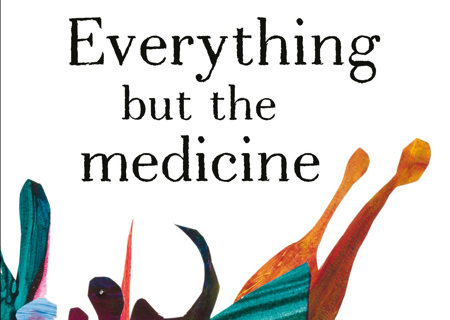Launch speech for Everything But the Medicine by Lucy O'Hagan
Delivered by Barbara Fountain, editor of New Zealand Doctor
Tēnā koutou, tēnā koutou, tēnā tatou katoa.
Ko Barbara Fountain tōku ingoa
Nō Ōtautahi taku whānau
Kei Tāmaki Makaurau taku kāinga inaienei
Tēnā koutou, tēnā koutou, tēnā koutou katoa
Welcome to this awesome occasion for a very awesome woman, writer, performer, doctor and healer — Lucy O'Hagan — celebrating the launch of Lucy’s book Everything But the Medicine.
Lucy has been writing for my publication New Zealand Doctor Rata Aotearoa for eight years now. So, in preparation for tonight i went back to the source.
When I opened the long-term archives of New Zealand Doctor and keyed in Lucy’s name, the first story that popped up was written the month before I arrived at the newspaper in June 1996.
It was titled ‘Who cares for doctors?’ and referred not to Lucy but to her father John O’Hagan who had co-authored a book called In Sickness and in Health.
In the article, the reporter wrote that the book was penned in response to the suicide rate among young doctors, and to prevent GP health problems. Chapters covered alcohol and drug abuse, work stress, marriage and medicine, healthcare and the family, and the problems facing women doctors.
Coincidentally, all topics to be tackled nearly 30 years on by daughter Lucy.
It is not until April 2001 that Lucy’s name appears, and this is as the Otago/Southland rep on the College of GPs rural committee.
Then in 2004 she is speaking up in support of a local Wānaka midwife.
In 2011, in a college conference question-and-answer session, Lucy, described as a Wānaka GP and performer, suggests GPs should invite consumers to conferences and collaborate with them at all levels. The UK speaker agrees wholeheartedly.
By 2016, the Lucy we are here to celebrate is really testing her wings.
It is reported that Wānaka GP Lucy O'Hagan provided a heart-warming, funny and poignant address titled ‘Narrating Ourselves’ at the College conference. She received the Eric Elder Memorial Medal given each year, usually to a rural GP.
The reporter writes: ‘Dr O’Hagan implored attendees to shed their metaphorical white coats, to stop hiding behind the professional glass wall and hear what people really think. ‘Ask what people want from their lives, what wellbeing is really about, how they would like general practice to look. Let's create a new narrative.’
At the 2017 conference, Lucy shared the stage with two other writer doctors — poet and GP Glenn Colquhoun and ICU specialist David Galler, author of Things That Matter.
It was a session on art in medicine.
But it was for her address ‘Outing Burnout’ for which most conference goers that year will remember Lucy. She received a standing ovation.
After that I asked Lucy to write for me and her first ‘Just Wondering’ column appeared two months later — Rejuvenating with Sunny Lucky — about her visits to her qigong master — you'll find it in the book
And through Covid and health reforms it has been a wonderful relationship ever since, though maybe a little one-sided because I struck it rich. Finding a writer who is so clever with words, brave, funny, grounded, gracious and kind is like striking gold for an editor.
I finished reading Lucy’s book in the weekend — like most journalists I like to make the most of deadlines.
I finished and was telling my colleagues Monday morning that I have to get all the GPs to read it because it will help them recapture joy in their work.
Lucy urges doctors be themselves and not waste energy trying to project some white-coat ideal. Professional boundaries are needed for sure, but authenticity shines through and only then will the patient story be told and heard.
I sent a copy of the book to my GP sister last week and was nagging her to read it because I was desperate to hear what she thought.
Last night on WhatsApp, having tested positive for influenza B and looking rather poorly, she told me she loved the book and could see herself in parts of it.
Though I’m not sure she really got the self-care element as she went on to ponder whether she should go to work today. Doing vaginal examinations with your nose dripping into a mask is not very nice, I was told.
She texted me this morning: ‘OMG I actually called in sick for work!!!’
I count that as a Lucy success story.
For those of us who are patients, and that’s everyone, there is much to learn from this book about what really matters to the people most in need around us — and it is pretty much what matters to all of us.
Being treated fairly with compassion and an understanding of where we have come from and where we might go. And that includes acknowledging the partnership we have in Aotearoa through Te Tiriti o Waitangi.
It’s about trust, relationships and stories — all elements critical to healing, but under pressure as we see the growth of digital health tools and cuts to services.
Lucy shuts out the chaos of reform, the vacillations of bureaucrats and the ideologically dubious in health politics, and brings us into a small room where she sits with a fellow human being, or two.
While researching for tonight I found Lucy’s contribution to our ‘Few Words’ column back in 2016.
She wrote: ‘My funniest moments as a GP come from being a little absent-minded, so sometimes I leave the room mid-consult to get something, get distracted, buy a coffee, answer 10 questions, then take the next patient in, only to find the original one, patiently sitting there. Actually, I've done that a few times.’
Congratulations, Lucy. This is beautiful writing and I think through accumulated ‘aha’ moments it will have a big impact on everyone who reads it and beyond.
Tēnā koutou, tēnā koutou, tēnā tatou katoa.


